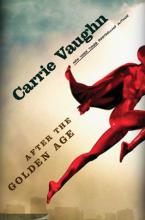inspiration + perspiration = invention :: T. Edison ::

Looking through my RSS feeds today, I noticed an article on Blastr.com entitled "7 superheroes who aren't doing nearly enough to save the world." As the comments to the article imply, the debate over superhero priorities is rather vacuous, all things considering. But I think the reasonable questions that this genre invites plague (and stymie) many of the Hollywood comic adaptions coming out now. To any of those screenwriters struggling with pulling off a superhero story, I'd suggest they read Carrie Vaughn's delightful novel After the Golden Age. Tip 1, Tinseltown: sometimes the person with the power isn't the best one to focus on.
Here's a short, spoiler-free synopsis: Celia West is the mundane daughter of two rich socialites who moonlight as vigilante superheroes. Her parents are known the world over, inspiring both enemies and groupies, and virtually invented the "saving the city" line of work. Even though Celia would just as soon keep out of the public eye as an ordinary citizen taking the bus to her job as an accountant, she is continually drawn back into the sphere of her parents as would-be criminal masterminds all hit on the most overused plot device in comicdom: kidnap the damsel as blackmail against the hero(es). But when Celia's work and personal life collide in a true supervillain's trial of the century, she is forced to step out of her parents' shadow to finally make a stand of her own.
Vaughn doesn't try to weigh the genre down with too much realism. Commerce City is another not-so-cleverly disguised New York (like Metropolis and Gotham), and the potential scientific explanations for the characters' powers are mentioned but not dwelt on (freeing this novel from plodding exposition or cryptic technobabble). The superhero device is accepted rather than deconstructed, and while there are wider sociopolitical ideas touched on, Vaughn makes sure they buoy the plot along rather than weigh it down into deeper waters than the subject matter could handle.
Instead of being a manifesto, this book functions as a character study with a sturdy plot exploring an eminently relateable question: when and how do you truly grow up? Yes, the question of this novel is not what makes a hero, but what makes a person. Celia's journey to maturity may be rougher due to her parents' overwhelming public personas, but she also faces very normal struggles: a dad with high expectations and poor communication skills, a mother whose love comes across a bit strong at awkward moments, a family friend who still thinks of her as a kid even after graduating from college.
The topic is explored humorously and lovingly, with light sprinklings of romance and action for seasoning and a healthy amount of suspense and soul-searching for good measure. One of my greatest reliefs was that Vaughn didn't feel the need to demonize some characters to make others look better; instead, she allowed characters to stand (or fail) on their own merits. Also, she managed to capably write fully realized villains without making them sympathetic: evil and destruction are never glorified in this book, and even a single act of indiscretion is shown to sometimes have consequences far beyond what we might imagine. Finally, there's the belief in this book that we never truly stop learning or growing up, and a reminder to not take family and friends for granted.
One word of warning for younger or more conservative readers: After the Golden Age is an apt description of the story, meaning this is a modern book with characters who may not conform to traditional rules of conduct in terms of language and sexual behavior. For the most part the book has nothing worse than a typical prime time TV show, but there's enough that I felt readers should be warned.
Overall, I highly recommend this book to readers who enjoy fun plots, engaging characters, and rich quirky prose.
This review was previously posted at Goodreads and Amazon. I did not receive anything from the publisher or author for this review (but they're free to send me something now if they'd like). The cover was designed by Peter Lutjen. The book is currently available from Tor Books in Hardcover ($24.99) and eBook editions ($11.99).





